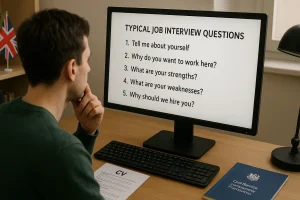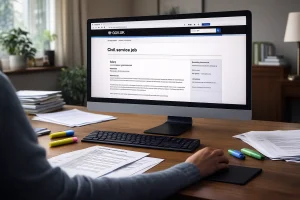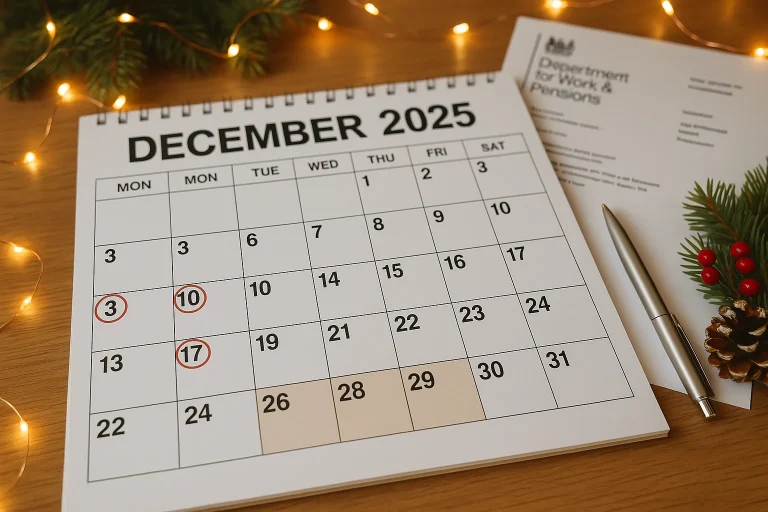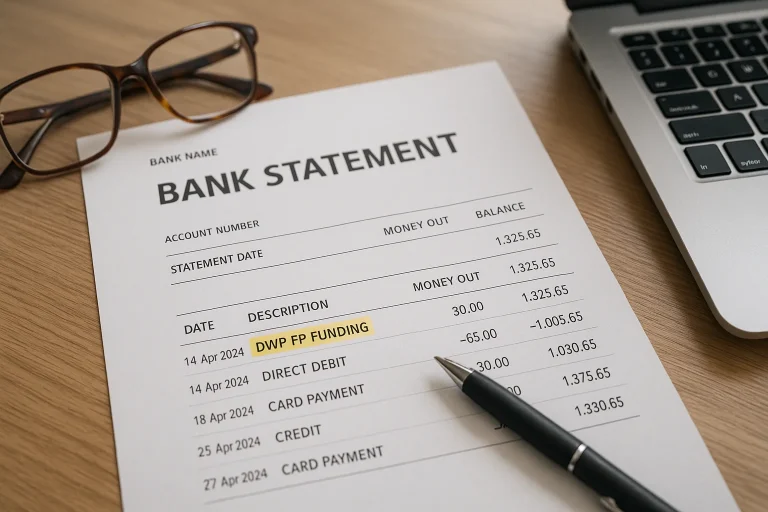The Department for Work and Pensions (DWP) uses pre-recorded video interviews to assess candidates for roles within the UK civil service.
These interviews are a crucial stage in the recruitment process and often focus on behaviours and strengths aligned with the Civil Service Success Profiles.
This guide explores the most common DWP pre-recorded interview questions, provides structured example answers, and offers practical tips to help candidates prepare and perform with confidence.
What is the DWP Interview Process?
The Department for Work and Pensions (DWP) uses a structured recruitment process designed to assess candidate suitability for roles across various service areas.
A critical stage of this process is the pre-recorded video interview. This interview format is used particularly for customer-facing positions such as Work Coach, Universal Credit Officer, and other support roles.
A pre-recorded video interview involves responding to a fixed set of questions within a specific time frame using an online video platform. Candidates do not interact with a live interviewer.
Instead, they record their answers using a webcam and microphone. The questions appear on screen, followed by a countdown timer that indicates when to begin speaking. Each answer typically has a time limit of one to three minutes.
The DWP uses this interview format to streamline hiring, ensure consistency across candidates, and enable flexible review by multiple assessors. It also removes the complexity of scheduling live interview slots and allows applicants to record their answers in a time and place convenient to them.
Common DWP Pre Recorded Interview Questions

The DWP’s interview process places a strong emphasis on assessing candidates through structured and competency-based questions, often rooted in the Civil Service Success Profiles framework.
Understanding the format and intent behind these questions is essential for providing relevant, high-scoring responses.
Behavioural Questions
Behavioural questions are designed to assess how a candidate has acted in specific situations in the past.
These scenarios help DWP assess whether the applicant’s previous experience aligns with the skills and behaviours required for the role.
These questions usually begin with prompts like:
- “Tell me about a time when…”
- “Describe a situation where…”
- “Give an example of…”
Examples of common behavioural interview questions asked in DWP pre-recorded interviews include:
- “Describe a time when you supported a vulnerable individual or customer.”
This tests your empathy, problem-solving, and ability to provide tailored support in challenging circumstances. - “Tell us about a situation where you worked effectively as part of a team.”
This assesses your collaboration skills and ability to build positive working relationships. - “Explain how you prioritised tasks during a busy period.”
This checks how well you can manage competing demands and deliver results under pressure. - “Give an example of when you had to communicate a difficult message to someone.”
This question is often linked to the Civil Service behaviour of ‘Communicating and Influencing.’ - “Tell us about a decision you made quickly and the outcome.”
This targets the behaviour ‘Making Effective Decisions’ and tests your judgment and accountability.
These behavioural questions allow the assessors to measure your fit for key success profile behaviours like:
- Making Effective Decisions
- Delivering at Pace
- Working Together
- Managing a Quality Service
- Communicating and Influencing
Strength-Based Questions
Strength-based questions are aimed at discovering what energises and motivates you. They are less about past achievements and more focused on how your natural preferences align with the responsibilities of the role.
Common strength-based questions include:
- “What types of tasks do you find most enjoyable at work?”
This helps assess how well your interests align with the routine duties of a DWP role. - “Do you prefer working on your own or as part of a team?”
While there’s no wrong answer, your response should reflect the requirements of the job you’re applying for. - “How do you handle repetitive tasks?”
Many DWP roles involve administrative or process-driven work, so assessors want to know you can remain motivated. - “When have you felt most satisfied in a role?”
This gives insight into what type of work or environment helps you thrive.
Unlike behavioural questions, there is no STAR method required for strength-based questions. Instead, assessors are looking for authenticity, enthusiasm, and alignment with the job.
Situational Judgement or Scenario-Based Questions
Though less common in the pre-recorded stage, some interviews may also include scenario-style questions where you are asked how you would respond to a hypothetical situation.
For example:
- “How would you respond if a customer became aggressive over the phone?”
- “What would you do if you noticed a colleague making consistent errors in benefit claims?”
These test both judgment and alignment with DWP policies and civil service values. Responses should reflect professionalism, fairness, and adherence to procedure.
Being familiar with these question types allows candidates to tailor their preparation and structure answers that hit the key assessment points expected by DWP recruiters.
How to Structure Your Answers Using the STAR Method?

DWP interview assessors expect responses to follow a structured format, with clear and concise delivery. The STAR method is the recommended approach for answering behavioural interview questions.
The STAR format is outlined as follows:
| STAR Element | Explanation |
| Situation | Describe the context or background of your example |
| Task | Explain what you were required to do |
| Action | Detail the specific actions you took to resolve the situation |
| Result | Share the outcome and any lessons learned |
Using STAR ensures that answers remain focused and demonstrate relevant competencies. Candidates who fail to provide structured responses often miss out on full marks, even if they have strong examples.
This method is particularly useful when answering questions that begin with “Tell me about a time…” or “Describe a situation where…”
Best Example Answers to DWP Interview Questions
The quality of your response during a DWP pre-recorded interview can significantly impact your overall score.
Using real-life examples that follow the STAR method allows you to give structured and detailed answers that clearly demonstrate the required competencies. Below are expanded sample answers for several commonly asked questions.
1. Describe a time when you dealt with a difficult customer
Situation: In my role at a local council’s housing department, a tenant called in anger after their maintenance issue hadn’t been addressed for over two weeks.
Task: I was responsible for calming the customer, identifying the cause of the delay, and ensuring a resolution was put in place.
Action: I began by listening without interrupting, showing empathy for their situation. I apologised for the inconvenience and explained I would investigate immediately. I checked the work order system, identified a processing error, and escalated the request to the housing maintenance team, stressing the urgency.
Result: The issue was resolved within 48 hours. The customer later called back to express their gratitude. I also flagged the system error, which led to an internal review that improved future tracking.
This response shows customer service, problem-solving, and communication—key behaviours for many DWP roles.
2. Tell us about a time you had to prioritise multiple tasks
Situation: While working as an administrator in a local job centre, I was responsible for managing daily appointments, processing claims, and handling urgent emails.
Task: One morning, I had to juggle preparing client files for scheduled appointments, responding to an urgent request from senior management, and covering reception due to a colleague’s absence.
Action: I created a priority list and blocked out time to handle each item. I delegated file prep to a junior colleague who had spare capacity and handled the senior management task first as it had a tighter deadline. I coordinated with the front desk to manage interruptions while I completed the tasks.
Result: All three responsibilities were completed on time. My manager later commended my ability to stay calm under pressure and manage competing priorities.
This example demonstrates the behaviours of Delivering at Pace and Working Together.
3. Tell us about a decision you made under pressure
Situation: During a backlog period in benefit claims processing, our team was under pressure to clear cases while maintaining accuracy.
Task: I was presented with a claim that lacked certain documentation but met other eligibility criteria. I had to decide whether to approve it or delay for further clarification.
Action: I reviewed the claimant’s history and noted consistent records of eligibility. I consulted a senior advisor for a second opinion and documented the rationale behind my decision to approve the payment under discretionary guidelines.
Result: The payment was processed, and no compliance issues were raised during audit. My proactive decision-making helped avoid delay for the claimant and maintained service delivery.
The response highlights Making Effective Decisions and Managing a Quality Service.
4. What does good customer service mean to you?
Good customer service is about meeting the customer’s needs while remaining professional, consistent, and empathetic. For example, in my previous role, I dealt with clients who were anxious about benefit payments. I ensured I was clear in communication, explained the process in simple terms, and followed up proactively. As a result, customer complaints were significantly reduced during my time in the role.
Although strength-based, this question allows the candidate to showcase behaviours such as Communicating and Influencing and Managing a Quality Service.
5. Tell us about a time you worked as part of a team to achieve a goal
Situation: At a community outreach centre, I was part of a team responsible for launching a job readiness programme for long-term unemployed individuals.
Task: We had four weeks to develop and deliver a programme that included CV writing, interview practice, and digital skills workshops.
Action: I led the digital skills section, created learning materials, and coordinated session scheduling with colleagues. I also collected participant feedback to refine the delivery.
Result: The programme was completed on time and led to over 60% of participants securing interviews within two months. Our team received a community service award for the initiative.
This demonstrates Working Together, Leadership, and Delivering at Pace.
Summary of Effective Answer Traits:
| Question Type | Key Traits Assessed |
| Difficult Customer | Empathy, conflict resolution, communication |
| Prioritising Tasks | Time management, decision-making, adaptability |
| Decision Under Pressure | Judgement, confidence, accountability |
| Strength-Based (Customer Service) | Motivation, values, consistency |
| Teamwork Example | Collaboration, planning, leadership |
These elaborated answers serve as a guide for how to approach DWP interview questions in a way that clearly communicates relevant competencies and maximises the chance of a high score.
What Are the Tips for Success in Your DWP Video Interview?

Preparation plays a crucial role in video interview performance. Unlike in-person interviews, there is no opportunity for real-time feedback or follow-up questions, so every response must be as clear and complete as possible.
Key preparation tips:
- Read the job description carefully to understand the behaviours and strengths required
- Practise delivering STAR-based answers aloud to improve fluency
- Record yourself answering mock questions to identify areas of improvement
- Familiarise yourself with the Civil Service Behaviours and Success Profiles
- Ensure your technical setup is working properly, including internet, webcam, and microphone
The setting in which you record the interview also matters. Choose a quiet, neutral background with good lighting. Avoid distractions such as background noise, interruptions, or clutter in the frame.
Presentation is also important. Even though the interview is recorded, candidates should dress professionally and maintain eye contact with the camera, as they would in a face-to-face interaction.
Common technical requirements include:
- A desktop or laptop computer with a webcam
- A stable internet connection
- An updated web browser (Chrome, Firefox, etc.)
- A quiet environment with minimal background noise
What to Expect After the Interview?
After submitting a pre-recorded interview, candidates are assessed based on a structured scoring system. Each question is marked individually, with scores reflecting how well the response aligns with the behavioural or strength-based indicators.
DWP assessors use a points-based system, often ranging from 1 to 7 per question. A high score requires candidates to provide:
- Relevant examples
- Specific actions they took
- Clear alignment with the job’s behavioural expectations
Results are typically shared within one to three weeks. In some cases, candidates who score highly may be added to a merit list for future vacancies, even if no immediate position is available.
The feedback process may be limited to a summary score for each assessed behaviour or strength, rather than detailed comments.
How to Prepare for a DWP Job Application?

Before applying for a role at the DWP, candidates should review the job advert thoroughly. Each advert includes a detailed breakdown of the responsibilities, required behaviours, and potential assessments.
Common preparation tasks include:
- Identifying which Civil Service Behaviours are listed in the job description
- Preparing examples that align with those behaviours
- Reviewing the structure of Civil Service interviews
- Completing any required online assessments or tests in advance of the interview
Some roles require Situational Judgement Tests (SJTs), which assess how candidates respond to typical workplace scenarios. These tests are usually untimed but require careful reading and reasoning to choose the most appropriate responses.
To support preparation, many applicants find it helpful to maintain a document listing examples of situations where they demonstrated key competencies, such as:
- Communicating clearly with the public
- Managing difficult conversations
- Prioritising tasks under time constraints
- Handling confidential information
The table below outlines the types of Civil Service Behaviours and how they may be assessed in interviews:
| Civil Service Behaviour | What Interviewers Look For |
| Communicating and Influencing | Ability to convey information clearly and respectfully |
| Delivering at Pace | Capacity to manage workload effectively under pressure |
| Working Together | Teamwork, cooperation, and relationship building |
| Making Effective Decisions | Judgement, problem-solving, and decision-making |
| Managing a Quality Service | Commitment to standards, consistency, and customer satisfaction |
| Developing Self and Others | Willingness to learn and support development of others |
Understanding how to present evidence for each behaviour will help candidates stand out in their interviews.
Final Thoughts
Securing a role with the DWP is a competitive process, but preparation is the key to success. By understanding the interview format, practising structured responses, and familiarising yourself with civil service behaviours, candidates can present themselves as strong, capable, and job-ready.
Stay confident, rehearse thoroughly, and remember – the more prepared you are, the more natural and composed you’ll appear in your responses.
FAQs About DWP Pre Recorded Interviews
How long does a DWP pre-recorded interview take?
Most DWP pre-recorded interviews take around 30 to 45 minutes, depending on the number of questions and response time per question.
Can you retake questions in a DWP pre-recorded interview?
Generally, no. Most systems used by the DWP allow only one attempt per question, so preparation is crucial.
What kind of questions are asked in a DWP Work Coach interview?
Expect a mix of behavioural and strength-based questions, often focused on customer service, teamwork, and resilience.
How are DWP interviews scored or assessed?
Interview responses are scored using the Civil Service Success Profiles framework. Each question is evaluated on how well it demonstrates relevant behaviours and strengths.
What is the STAR method and why is it important?
The STAR method helps structure responses clearly. It’s important because it ensures you present complete and relevant answers during competency-based interviews.
What are strength-based questions in civil service interviews?
These questions assess what energises and motivates you. Answers are expected to be more instinctive and reflect genuine interests or preferences.
How should you prepare for a civil service interview at home?
Create a quiet, well-lit space; practise answers in front of a camera; review the job description; and familiarise yourself with civil service behaviours.






